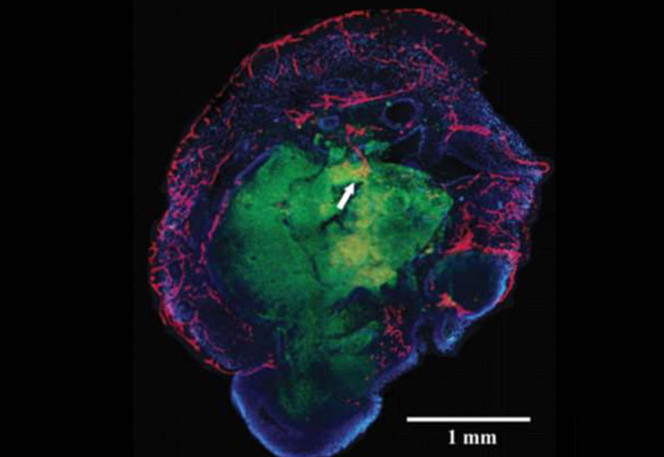Successfully developed miniature human brains in the laboratory
Scientists from the University of California (USA) have successfully developed miniature human brains accompanied by many blood vessels in the laboratory.
After transplanting small brains (just 1mm long) into mice for two weeks, scientists found the brain developed capillaries that pierced through all the layers within the brain, according to the Daily Mail on 5. / 4.

Images show that capillaries grow and pierce through all the tiny inner brain layers that have been successfully developed in the laboratory.
This achievement can help researchers develop larger human brains. In the future, they hope to use this brain cell to treat stroke patients.
This study was inspired by the study of rare disease Moyamoya - a pathology of cerebral vessels characterized by progressive lesions that slowly block blood flow to the brain - by a neurosurgeon Ben Waldeu of the University of California.
To study the brain involved in this disease, scientists have to create brains cultured from stem cells.
Dr. Waldeu and colleagues combined stem cells with other body cells to make blood vessels.
This study was published in NeuroReport.
- The reason that pets often have reduced brain
- Successfully cultivated mini human brains in the laboratory to try medicine
- Successfully developed human eye embryos in vitro
- Successfully cultured human brain in the laboratory
- The miniature gamma-ray burst in the laboratory
- Neuronic brains are like our brains
- Successfully cultured human liver in the laboratory
- Miniature universe was born in the laboratory
- Big brains don't mean smarter
- America developed chips implanted in human brains
- Successfully produced artificial sperm in the laboratory
- The robot can now cultivate human organs quickly
 Green tea cleans teeth better than mouthwash?
Green tea cleans teeth better than mouthwash? Death kiss: This is why you should not let anyone kiss your baby's lips
Death kiss: This is why you should not let anyone kiss your baby's lips What is salmonellosis?
What is salmonellosis? Caution should be exercised when using aloe vera through eating and drinking
Caution should be exercised when using aloe vera through eating and drinking